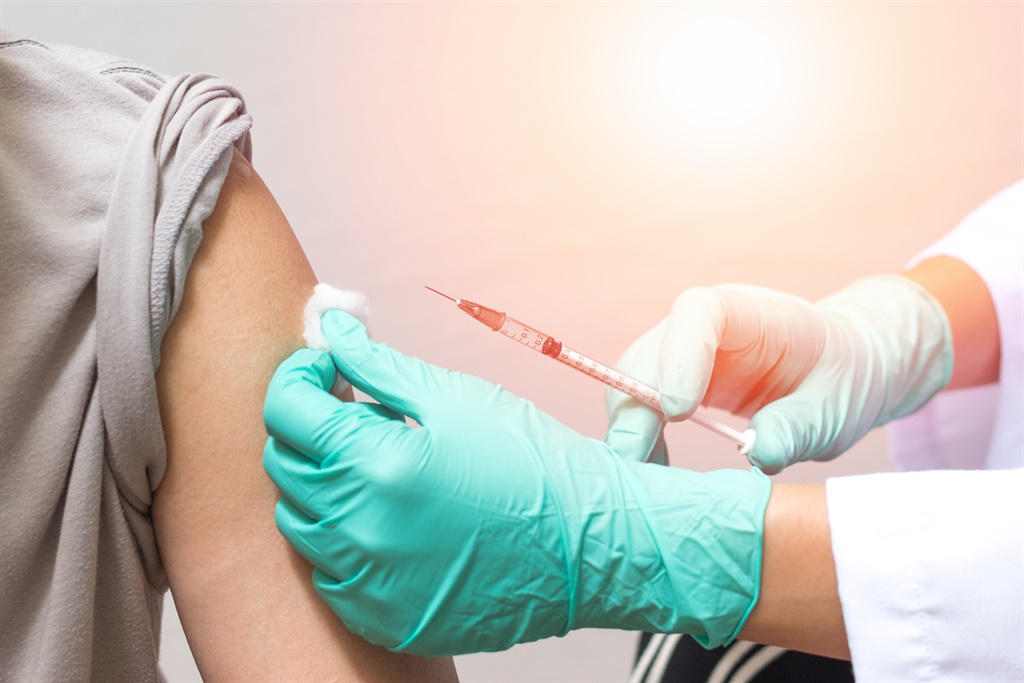
While the world is scrambling to develop a Covid-19 vaccine, the rate at which existing life-saving vaccines for other diseases are being used in South Africa has declined.
The decline has largely been blamed on the Covid-19 coronavirus pandemic and the associated lockdown. Now, as many lockdown measures have been eased and Covid-19 infection and mortality numbers have declined from peaks in July, government has set in motion plans to catch up on the immunisation backlog.
Popo Maja, spokesperson for the national department of health, tells Spotlight that a nationwide catch-up drive aimed at children under the age of five is set to start on November 1. Provinces are expected to catch up on all missed immunisations by the end of March 2021.
Decline in immunisation coverage between April and August
Spotlight previously reported that there had been a 21 percentage point decline in immunisation coverage, from 82% in April 2019 to 61% in April 2020.
Maja says between April and August 2020 there was a 10% decline in primary vaccinations for children under the age of one, with a significant decline in all nine provinces.
The picture doesn’t get any better when looking at the breakdown according to metros.
“Seven out of eight metropolitan municipalities were not able to vaccinate at least 80% of their children with all primary antigens,” says Maja.
“Forty-two (81%) districts did not reach the 2020 target during the lockdown period as compared to 22 (42%) districts during the same period in 2019.”
‘We’re in trouble, big trouble’
According to Gregory Hussey, a professor and director of Vaccines for Africa, a not-for-profit academic unit at the University of Cape Town, South Africa’s immunisation rates before lockdown were not ideal to begin with.
“We’re sitting on a time bomb basically ... Before it was bad, but now it’s worse. If for any reason there is, for example, a measles or rotavirus epidemic, we’re in trouble, big trouble. Covid-19 is not going to go away,” he says.
READ: The slow motion race for a TB vaccine
Data from the latest edition of the District Health Barometer – a collection of health indicators which presents a snapshot of how well the health districts in South Africa provide primary health care to the population – show that South Africa’s immunisation coverage for children under the age of one was only at 81.9%, falling short of the global immunisation target of 90%.
Hussey adds that while children were mostly spared the devastation of Covid-19, the impact of the pandemic on them is going to be seen in other infectious diseases.
He says lockdown protected children to a certain extent because they were not interacting with other children and thus there was no opportunity for infections to spread. However, he cautions that there will be a rise in infections as the country opens up. This can already be seen, as a recent statement from the National Institute for Communicable Diseases shows an increase in the circulation of respiratory syncytial virus, a common childhood illness.
Secondary impact
According to Dr Yin Yin Aung, a maternal and child health specialist at Unicef SA, children who do not receive immunisations could also have secondary illnesses. She explains that when children do not get immunised, they also do not get deworming treatment, Vitamin A supplements, information about nutrition, or the appropriate treatment if they have infection or diarrhoea.
She adds that Unicef, along with the World Health Organisation (WHO), helps the national department of health in dealing with immunisation backlogs and other child health interventions.
“It is critical that no child is left behind. This is the aim of this catch up drive, to get all the children protected against preventable diseases,” says Aung.
Her advice to parents and caregivers whose children missed their immunisations is to go to a clinic with the child’s Road to Health booklet and catch up on immunisation and other health services.
Professor Susan Goldstein, a public health specialist and deputy director of Priceless, a unit of the SA Medical Research Council, is blunt in her assessment of what would happen without a successful immunisation catch-up plan.
“There are going to be more children who die,” she says.
“We have a fantastic immunisation schedule ... which has saved thousands and thousands of lives. When the children are not fully immunised, the possibility of outbreaks immediately occurs.”
Goldstein assures parents that it is safe to take children to get vaccinated even after the age stated in the Road to Health booklet.
“It doesn’t matter if it’s a bit late, just get them immunised. It’s safe to do so and it will protect your child,” she says.
The catch-up drive
Maja explains that the national department of health, together with Unicef, the WHO and the Clinton Health Access Initiative had been planning a focused intervention called Project Jiki’izinto to improve immunisation performance in eight metropolitan municipalities and six low-performing districts.
However, due to the negative impact of Covid-19 on immunisations, the plan will now cover all 52 districts with an integrated child health catch-up drive.
“The catch-up drive will be conducted in all districts for children under five years of age. However, 12 priority districts have been identified. These districts have the highest number of under-vaccinated children and include seven of the eight metropolitan municipalities,” he says.
The project, Maja says, aims to restore and intensify routine immunisation services, and provide catch-up doses to children who have missed vaccinations. It also aims to strengthen the provision of catch-up immunisations going forward.
He adds that the drive will also be used as a platform for providing other child health services, including Vitamin A supplementation, de-worming, growth monitoring and HIV services.
The 12 priority districts will have their catch-up drives first, running from November 1 2020 to January 31 2021, Maja explains. The other districts’ drives will run from January 2021 until March 31 2021.
Maja says the drive will form part of the Side-by-Side Campaign, which is “a national mass communication campaign that aims to empower and support caregivers and families to provide the full range of care that children require for optimal growth and development”.
How the provinces will implement the plan
Maja says provinces were “officially requested” to submit implementation plans and that virtual meetings are held regularly to “assist provinces to plan for the nationwide integrated child health catch-up drive”.
“Documents including a concept document, a field guide and other tools have been developed and shared with provinces to provide guidance in planning for the catch-up drive,” he says.
Spotlight asked the departments of health in KwaZulu-Natal, Gauteng, the Eastern Cape and the Western Cape about their catch-up plans.
The Eastern Cape and KwaZulu-Natal departments had not responded by the time of publication, despite many efforts to contact them.
Gauteng
Kwara Kekana, spokesperson for the Gauteng health MEC, says their plan still needs to be presented to the national department of health for approval, but is in progress.
She admitted to there being a significant decline in immunisation coverage in the province during lockdown. In the period from April 21 to June, immunisation coverage had declined by nine percentage points compared with the same time period in the previous year, decreasing from 86.5% to 77.5%.
Kekana says there is a plan in progress that will be conducted in a phased manner, starting in November.
She adds that the first phase of the drive will be conducted in Ekurhuleni, Johannesburg and Tshwane, while the second phase, starting in December, will be in Sedibeng and the West Rand.
Western Cape
Byron La Hoe, communications officer for the Western Cape department of health, told Spotlight that the province had already implemented a plan in August to catch up on the missed immunisations.
He said lockdown had caused a 22% reduction in immunisations in the province’s facilities in April 2020 compared with April 2019.
The plan, according to La Hoe, is based on information provided by the WHO in March to guide efforts “to conserve optimal immunisation cover through the provision of catch-up outreach services”.
“The information was customised/translated for the Western Cape and shared with services by means of a formal circular,” he explains.
The catch-up drives are conducted in high-risk areas, such as areas where immunisation cover might be low and where there is potential risk for an outbreak.
READ: South Africans still fear a Covid-19 vaccine, survey shows
La Hoe says to ensure that all children are immunised, health facilities are following up with parents who missed appointments. And to make the public aware of the need for children to have up-to-date vaccinations, the province launched the #VaccinesWork communication campaign in August.
“The core message is to inform parents that important childhood immunisations are available to children who have fallen behind due to the Covid-19 pandemic,” says La Hoe.
“Parents are also reminded to make their appointments and bring their healthy children to the clinics for these free immunisations.”
He added that, at the time of the interview, the Western Cape department of health had received no formal communication regarding child immunisation from the national department of health.
“However, the department is committed to ensuring that effective catch-up interventions take place in the province, and the sharing of data and information with the national department of health.”
National vaccination coverage survey to be released soon
In March 2019 it was announced that a national vaccination coverage survey would be conducted to provide a more comprehensive overview of immunisation coverage in the country. The last immunisation survey was done in 1994.
According to one of the study authors, professor Rosemary Burnett, the survey has been conducted successfully and will hopefully be released to the national department of health by the end of October. Burnett declined to comment on the findings until then.
Maja confirmed that the survey findings would be released before the end of 2020.
This article was produced by Spotlight, health journalism in the public interest.




 Publications
Publications
 Partners
Partners











